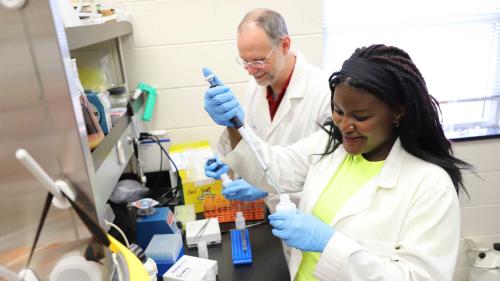“Sang” to Sing New Tune for Appalachian Organic Ginseng Farmers with help from UVA Wise

UVA Wise scientists will research solutions for rural farmers looking to farm healthy and organic ginseng as part of a multi-institutional research group receiving a $455,000 grant from the U. S. Department of Agriculture.
The highly competitive three-year grant was awarded to the lead institution, Middle Tennessee State University’s International Ginseng Institute (IGI). UVA Wise’s John C. Buchanan Endowed Chair of Biology, A. Bruce Cahoon, will coordinate soil analysis—exploring best practices in organic ginseng growth and prevention of fungal disease to promote rural sustainable farming.
“It’s very exciting because federal funding is difficult to get and when you do get sizable funding it’s like lightning struck,” says Cahoon.
With the new funding, MTSU, along with UVA Wise, is teaming up with researchers from the University of Tennessee and Pennsylvania State University.
“The good part for UVA Wise is we are working as equal partners with other research-intensive universities. We are a liberal arts school and teaching is our primary focus but to say we have the expertise and are an equal partner is very satisfying,” says Cahoon.
Using environmental DNA metabarcoding, Cahoon and his students will conduct soil analysis on samples from Appalachian rural farmers searching for the bacteria and fungi associated with healthy organic ginseng growth. Their aim is to identify microbes that could be used to organically control ginseng fungal blight.
“Our students are going to get the opportunity to work on a project as undergraduates and get paid. Plus, you don’t know where it will lead them and what opportunities will open up,” says Cahoon.
With support from the Buchanan endowment, Cahoon, 2020 UVA Wise graduate Richard Turner and UVA Wise senior Hubertine Moyo worked together on the pilot study from 2019 to 2020 analyzing and collecting the first batch of ginseng soil sample data.
The promising results encouraged the International Ginseng Institute to include UVA Wise on the USDA application which was awarded last month.
Ginseng, an Appalachian native root also known as “Sang,” has a huge market in East Asia. With the wild ginseng supply diminishing, researchers hope to discover how best to farm organic ginseng to meet the high-demand overseas.
“If you can grow organically, the price is higher and it’s very valuable to traditional Chinese medicine,” says Cahoon.
There are challenges. One is that a crop of ginseng takes four to 10 years to mature and harvest. Another is fungal blight spoiling the soil—preventing plant growth or causing withering.
Currently, there are no adequate or comprehensive organic ginseng farming studies available to help guide farmers, says Cahoon.
To start, the project will collect samples from ginseng farmers across the Appalachian region from Tennessee to Pennsylvania. Once collected, Cahoon and his students will prepare samples for DNA sequencing and conduct analysis.
The ultimate goal is producing a guide for farmers on best management practices for growing organic ginseng that will be distributed through agriculture extension programs throughout Appalachia and beyond.